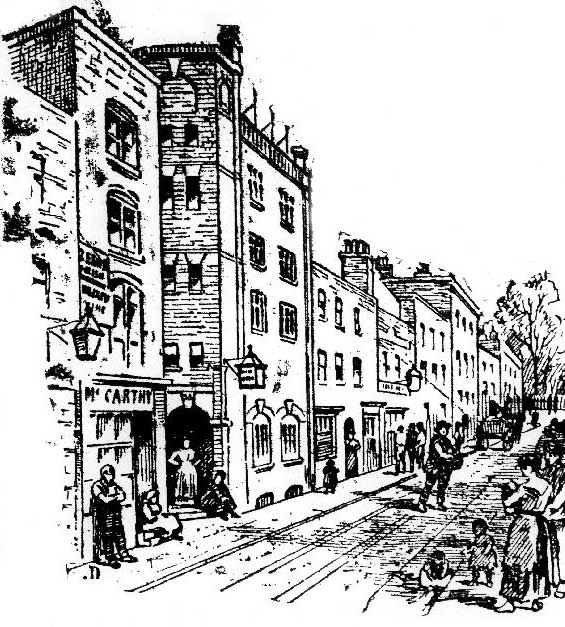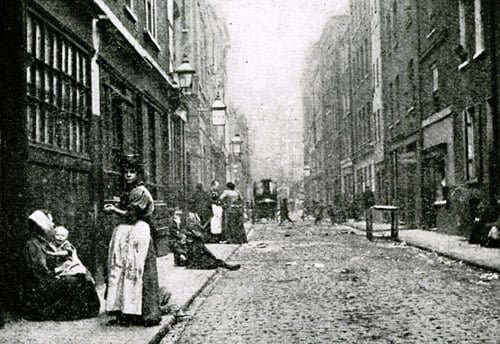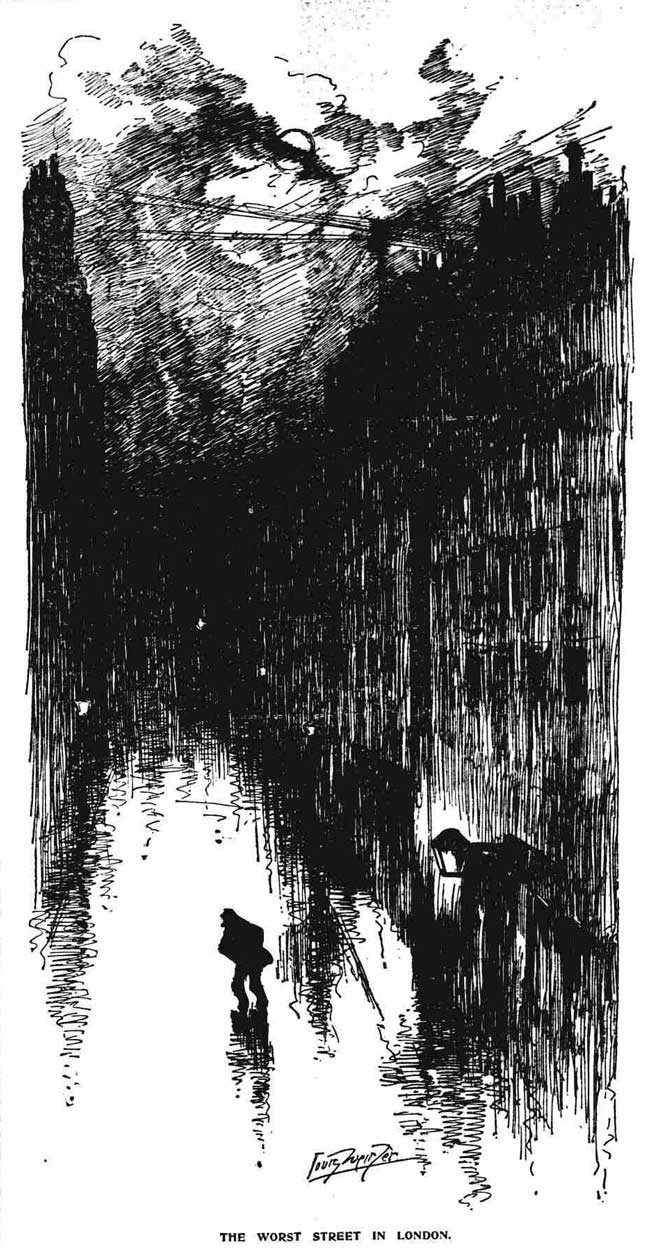On the 26th of May, 1901, the murder of Annie Austin took place in a common lodging house in Dorset Street, the same street in which the murder of Mary Kelly had taken place, on the 9th November, 1888.
This latest murder led to a flurry of press activity, and newspapers began reporting on “another ‘orrible murder in Whitechapel.”

DETRIMENTAL TO THE DISTRICT
This latest press coverage irked the Reverend E.C. Carter, the new vicar of St Jude’s Church on Commercial Street; and he fired off an angry missive to The Times complaining that:-
“…all the murders in the East End are stated to have been committed in Whitechapel. The latest tragedy did not take place within the limits of the parish. The statement that these murders are committed in Whitechapel is detrimental to the district, and many residents have moved out as a result…”
THE GAZETTE RESPONSE
On the same day that The Reverend Carter’s letter appeared in The Times, Wednesday, 29th May, 1901, The Pall Mall Gazette published the following article, which took issue with Mr. Carter’s objections:-
TALES OF MEAN STREETS
“Mr. Carter, the Rector of St Jude’s, Whitechapel, protests this morning against the custom of attributing every murder done down East to the district in which he resides.
This libel he declares to have caused the migration of residents, who can ill be spared, to less notorious neighbourhoods.
His plea for the good name of his parish is reasonable enough.
The poor woman, Annie Austen, whose mysterious doing to death has been its motive, has undoubtedly been “put away” not in Whitechapel, but in adjacent Spitalfields.

PAST MURDERS IN WHITECHAPEL
It is equally true that those of us who are middle-aged associate with Whitechapel not only the gruesome “Ripper” cases, but also the elaborately contrived butchering of Harriet Lane by Henry Wainwright, most Italian of British assassins, which occurred so far back as 1875, and which was planned there because the premises happened to be convenient for the temporary hiding of the body.
Mr. Carter will, however, convert the Press with difficulty from such headings as “Another Whitechapel Murder.”
A RESEMBLANCE TO THE RIPPER CRIMES
Annie Austen has been slaughtered hard by the scene of one of the “Ripper” crimes, the murder of Mary Jane Kelly in Dorset-street.
The deed bears such a strong resemblance, too, to that ghastly series, that the East-end will need to keep its nerves under strong control to prevent a recurrence of the scare of thirteen years ago.
What an oppressive time it was!
The horror rapidly culminating until the fiend despatched two victims, Stride and Conway or Eddowes, in one night; the writing on the wall, which the police very properly obliterated, but which was alleged to have been, “Twelve, and I give myself up;” the promiscuous arrests and the pecuniary recompenses exacted by at least one of the arrested from indiscreet reporting; the grimy revelations of vice in its most squalid form, with “Sweet Violets,” the song that Kelly sang within a few hours of her death, as the relieving touch of romance – all these and many other recollections must resurge upon the public memory.
The “Ripper” murders must always exercise a peculiar fascination upon students of brain diseases and historians of manners.

JACK THE RIPPER SUSPECTS
Major Arthur Griffiths, no mean authority, asserts in his “Mysteries of Police and Crime” that their author was a West-end doctor, against whom suspicion, practically but not actually amounting to proof, gradually collected.
Others have thought to discover him in a pauper lunatic asylum, and in a man sentenced to a term of imprisonment on a totally different charge.
The chances are, however, that “Jack the Ripper” will never be discovered; and really, when the neighbourhood and its inhabitants are considered, we do not know that the police were much to blame.
MORE POLICE ARE NEEDED
The Rector of St Jude’s observes that these deeds will continue so long as parts of the East-end have a smaller proportion of police and a larger amount of lawlessness than, let us say, South Kensington.
The force has admittedly to cover too much ground in the beats off the Mile-end and Commercial roads, and to deal with very difficult classes of people.
UNEQUALLED OPPORTUNITIES FOR DARK DEEDS
A knowledge of the neighbourhood rendered of evil repute by the “Ripper” murders, and now by the death of Annie Austen, leads to the inevitable conclusion that the open spaces, due to the circumstance that most of the buildings were put up before the land had acquired a fraction of its present value, and the dark recesses under the railway arches, afford unequalled opportunities to a criminal who is handy with the knife and fleet of foot.

POLICE CONSTABLE THOMPSON
Constable Thompson, who was stabbed the other day by Barnet Abrahams actually saw the “Ripper” coming away from one of his slaughters, but the creature dodged through the streets and alleys and escaped.
We may observe by the way that the sentence on Abrahams cannot have tended to increase the respect for the law in Whitechapel and neighbourhood.
INDIGENT MISERY
Yet the inhabitants, whether Brtish or alien, stand in urgent need of the imposition of order upon their meanest streets.
The kind of lodging house to which Annie Austin and her companion repaired is not, to put it mildly, a triumph of twentieth-century civilisation. Seventy-two cubicles, all occupied by unknowns, separated by thin partitions of match-board, which do not reach the floor, form resorts that show philanthropy to have much endeavour before it can overtake the vast amount of indigent misery, if indeed it ever does.
We write with all respect to Moore, the keeper of the lodging house, who seems to have watched over his tenants the night through, and who certainly behaved with promptness and charity directly he discovered Annie Austin’s condition.
INCREASED POLICE NOT THE ANSWER
But this latest Whitechapel crime has many other morals besides that pointed out by the vicar of St Jude’s.
Anyone who remembers the “Ripper” year will recall the generosity with which painfully obvious detectives were poured into the place, and yet the murders went on.
POSSIBLE MEASURES TO TAKE
Closer inspection of lodging houses is one possible remedy, a Destitute Aliens Bill another, a measure for the better housing of the poorest a third.
Withall, such deeds must occur in crowded cities when women such as Annie Austin have sunk beyond rescue through drunkenness and want of self-control.”
